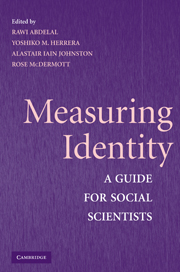Book contents
- Frontmatter
- Contents
- Contributors
- Introduction
- I DEFINITION, CONCEPTUALIZATION, AND MEASUREMENT ALTERNATIVES
- II SURVEY METHODS
- III CONTENT ANALYSIS AND COGNITIVE MAPPING
- 7 Quantitative Content Analysis and the Measurement of Collective Identity
- 8 The Content and Intersection of Identity in Iraq
- 9 A Constructivist Dataset on Ethnicity and Institutions
- IV DISCOURSE ANALYSIS AND ETHNOGRAPHY
- V EXPERIMENTS
- Bibliography
- Index
9 - A Constructivist Dataset on Ethnicity and Institutions
Published online by Cambridge University Press: 05 June 2012
- Frontmatter
- Contents
- Contributors
- Introduction
- I DEFINITION, CONCEPTUALIZATION, AND MEASUREMENT ALTERNATIVES
- II SURVEY METHODS
- III CONTENT ANALYSIS AND COGNITIVE MAPPING
- 7 Quantitative Content Analysis and the Measurement of Collective Identity
- 8 The Content and Intersection of Identity in Iraq
- 9 A Constructivist Dataset on Ethnicity and Institutions
- IV DISCOURSE ANALYSIS AND ETHNOGRAPHY
- V EXPERIMENTS
- Bibliography
- Index
Summary
Constructivism – the principal theoretical revolution in the study of ethnic identities over the past thirty years – has established that individuals have multiple ethnic options with a choice of which one to activate in any given context, and that the ethnic identities they activate can change over time, often endogenously to political and economic outcomes. The implication for our data collection efforts is that they must make a distinction between ethnic “structure” (the set of potential ethnic identities that characterizes a population) and ethnic “practice” (the set of identities actually activated by that population), must accommodate the possibility of the multiplicity of identities in both structure and practice, and must be sensitive to context and time in collecting these data. But our cross-national datasets on ethnic groups, and the measures constructed on the basis of these datasets, are resolutely primordialist – they do not distinguish between structure and practice, do not accommodate the possibility of multiplicity, and are not sensitive to time and context. The lack of theoretically justified data hampers the production of high-quality research on the origin and effect of ethnic diversity and on related concepts. Although there is now a steadily increasing number of studies on the role of ethnicity in determining economic growth, the consolidation of democracy, the distribution of public goods, the study of large-scale violence, and the shape of party systems, the poor quality of the data on which these studies are based means that we cannot be confident of their results.
- Type
- Chapter
- Information
- Measuring IdentityA Guide for Social Scientists, pp. 250 - 276Publisher: Cambridge University PressPrint publication year: 2009
- 5
- Cited by



